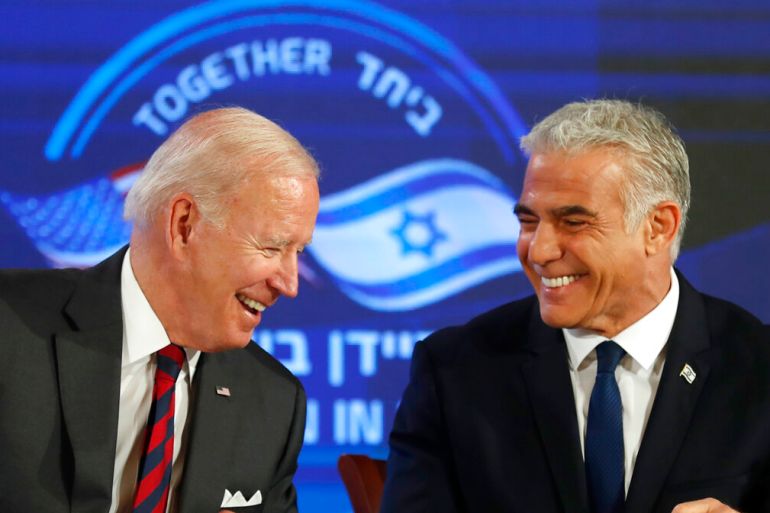Biden, Lapid discuss ‘shared commitment’ against nukes for Iran
There was no mention of disagreement over the looming revival of the Iran nuclear deal in US and Israeli statements describing the call.

US President Joe Biden and Israeli Prime Minister Yair Lapid have re-emphasised a joint commitment against allowing Iran to obtain a nuclear weapon, as Washington and Tehran push to revive a 2015 nuclear deal.
The two leaders spoke by phone on Wednesday for the first time since the apparent breakthrough in the talks to revive the deal earlier this month.
Keep reading
list of 3 itemsIran’s Raisi: IAEA inquiry must close for nuclear deal to happen
Iran delivers European ‘peace initiative’ on Ukraine to Russia
“Prime Minister Lapid and President Biden spoke at length about the negotiations on a nuclear agreement, and their shared commitment to stopping Iran’s progress towards a nuclear weapon,” the Israeli government said in a statement.
The White House echoed the Israeli remarks, saying that Biden “underscored US commitment to never allow Iran to acquire a nuclear weapon”.
Biden and Lapid signed a joint declaration last month laying out the same sentiments while the US president was in Israel.
The 2015 multilateral deal, which was nixed by then-President Donald Trump in 2018, saw Iran scale back its nuclear programme in exchange for the lifting of international sanctions against its economy.
The Biden administration has been engaged in indirect talks with Iran to restore the pact since April of last year.
Iran denies seeking a nuclear weapon, and Israel – one of four countries that never signed on to the Treaty on the Non-Proliferation of Nuclear Weapons (NPT) – is widely reported to have a clandestine nuclear arsenal.
Israel has been vocal in opposing a US return to the nuclear deal, formally known as the Joint Comprehensive Plan of Action (JCPOA). But the US and Israeli statements describing the Biden-Lapid call on Wednesday did not mention disagreements in the two leaders’ positions.
After months of stalling, optimism for reviving the deal was renewed in August after the European Union presented a “final text” for a draft agreement.
US officials said earlier this month that Washington was encouraged that Tehran had dropped its demand for removing its Islamic Revolutionary Guard Corps (IRGC) from Washington’s list of “foreign terrorist organizations” (FTO) – a request that had been explicitly rejected by Biden.
Tehran responded to the EU’s proposal earlier this month, and in turn, Washington submitted comments on the Iranian reply.
Iran is now assessing the US response amid Qatari and European mediation efforts.
Back in Washington, as a new deal edges closer, Israel and its allies in the US have been advocating against reviving the pact.
Last week, Israel’s Defence Minister Benny Gantz visited Washington, where he told US National Security Advisor Jake Sullivan, according to an Israeli government statement, that “Israel opposes the nuclear agreement, as was presented to relevant parties”.
The pro-Israel lobby the American Israel Public Affairs Committee (AIPAC) has also been moblising against the possible revival of the deal. The group told supporters in an email last week that it sent a memo to congressional offices raising its concerns about a possible US return to the JCPOA.
“We are deeply concerned that the deal being discussed will undermine US security interests and those of our allies,” AIPAC said in the email, arguing that the deal would bring revenues to Iran, which it describes as the “world’s leading state sponsor of terrorism”, and may benefit Russia.
Proponents of the agreement have also started to rally behind it.
“No one wants Iran to be a nuclear power,” Democratic US Congresswoman Sara Jacobs wrote on Twitter on Wednesday.
“But let’s be clear: Trump’s plan of maximum pressure didn’t work. Iran got closer to a nuclear weapon and increased their bad behavior in the region. The Iran Deal is our best chance to prevent Iran from obtaining a nuclear weapon.”
In addition to addressing the Iran issue, the White House statement on the Biden-Lapid call said the US president “emphasized the importance of concluding the maritime boundary negotiations between Israel and Lebanon in the coming weeks”.
The statement did not mention Palestinians.